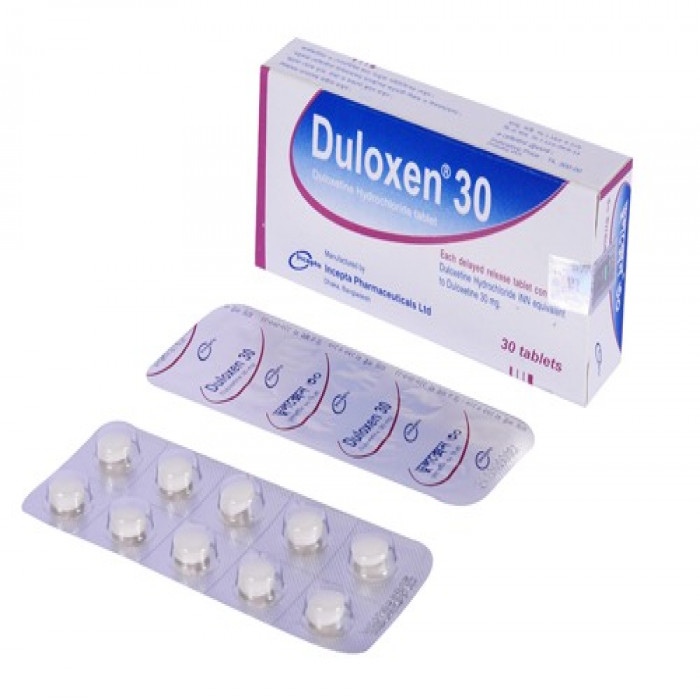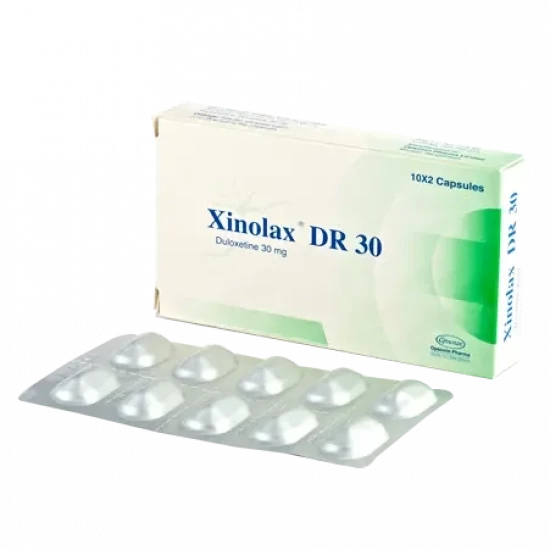
✔ 100% Authentic Product
👁️ Currently Viewing 2083
Stresin 30mg Capsule 10pcs
Stresin is used to treat depression, anxiety disorder, diabetic nerve pain, fibromyalgia, neuropathic pain, and stress urinary incontinence.
Discount
Price: ৳ 118
MRP:
৳
120
2%
Off

100% Genuine Products, Guaranteed

Safe & Secure Payments, Always

Fast, Secure & Efficient Delivery

Proper Packaging
 Cash on Delivery - All over Bangladesh
Cash on Delivery - All over Bangladesh Regular Delivery - 12-24 Hours, Dhaka City* Charge Tk.39-59
Regular Delivery - 12-24 Hours, Dhaka City* Charge Tk.39-59 Regular Delivery - 24-48 Hours, Other Cities* Charge Tk.99-110
Regular Delivery - 24-48 Hours, Other Cities* Charge Tk.99-110
 ফ্রি ডেলিভারিঃ - ৯৯৯ টাকা+ অর্ডারে, ঢাকা
শহরে
ফ্রি ডেলিভারিঃ - ৯৯৯ টাকা+ অর্ডারে, ঢাকা
শহরে ফ্রি ডেলিভারিঃ - ২৯৯৯ টাকা+ অর্ডারে, ঢাকার
বাহিরে
ফ্রি ডেলিভারিঃ - ২৯৯৯ টাকা+ অর্ডারে, ঢাকার
বাহিরে
100% Genuine Products, Guaranteed
Safe & Secure Payments, Always
Fast, Secure & Efficient Delivery
Proper Packaging
 Cash on Delivery - All over Bangladesh
Cash on Delivery - All over Bangladesh Regular Delivery - 12-24 Hours, Dhaka City* Charge Tk.39-59
Regular Delivery - 12-24 Hours, Dhaka City* Charge Tk.39-59 Regular Delivery - 24-48 Hours, Other Cities* Charge Tk.99-110
Regular Delivery - 24-48 Hours, Other Cities* Charge Tk.99-110 ফ্রি ডেলিভারিঃ - ৯৯৯ টাকা+ অর্ডারে, ঢাকা
শহরে
ফ্রি ডেলিভারিঃ - ৯৯৯ টাকা+ অর্ডারে, ঢাকা
শহরে ফ্রি ডেলিভারিঃ - ২৯৯৯ টাকা+ অর্ডারে, ঢাকার
বাহিরে
ফ্রি ডেলিভারিঃ - ২৯৯৯ টাকা+ অর্ডারে, ঢাকার
বাহিরে
✅ Description:
Duloxetine, a serotonin and norepinephrine reuptake inhibitor, is commonly prescribed for various conditions such as generalized anxiety disorder, major depressive disorder, diabetic nerve pain, fibromyalgia pain, and chronic muscle or joint pain. By balancing brain chemicals associated with anxiety and depression, it helps alleviate symptoms.
Available in capsule form for oral consumption, Duloxetine can be taken with or without food, though taking it with food may help prevent nausea. Dosage varies depending on factors like age, health status, and individual response to treatment. Typically, doctors start with a low dose and gradually increase it.
Consistency in taking doses is crucial for effectiveness, but if a dose is missed, it's advisable not to double up on doses. Overdosing on Duloxetine can lead to serious toxic effects.
Safety Advices

Alcohol
UNSAFE
It is unsafe to consume alcohol with Stresin as it may decrease alertness, affect vision, and cause drowsiness, leading to an increased risk of accidents and liver damage.

Pregnancy
CONSULT YOUR DOCTOR
Stresin may be unsafe to use during pregnancy. Limited studies in humans have shown harmful effects on the developing baby, so it's crucial to consult your doctor before using it during pregnancy.

Breastfeeding
CONSULT YOUR DOCTOR
Stresin is probably unsafe to use during breastfeeding as it may pass into breast milk and harm the baby. It's essential to consult your doctor before using it while breastfeeding.

Driving
CAUTION
Stresin may decrease alertness, affect vision, and cause drowsiness and dizziness. It's advised not to drive or engage in activities requiring mental focus until you know how it affects you.

Kidney
CONSULT YOUR DOCTOR
Stresin should be used with caution in patients with severe kidney disease. Dose adjustment may be necessary, so it's essential to consult your doctor before using it.

Liver
CONSULT YOUR DOCTOR
Stresin is probably unsafe to use in patients with liver disease and should be avoided. Consult your doctor before using it if you have liver problems.
✔️ Composition of Stresin 30mg Capsule
Duloxetine
✔️ Uses of Stresin 30mg Capsule
- Major depressive disorders
- Diabetic neuropathic pain
- Generalized anxiety disorder
- Stress urinary incontinence in women
✔️ Side Effects of Stresin 30mg Capsule
Common side effects of Duloxetine include nausea, dry mouth, fatigue, dizziness, sleepiness, constipation, and loss of appetite. However, severe side effects may also occur, warranting immediate medical attention. These can include liver damage symptoms like dark urine and yellowing of the skin, changes in blood pressure, agitation, tremors, seizures, skin reactions, vision problems, headaches, weakness, or confusion indicating low sodium levels in the blood.
✔️ How does Stresin 30mg Capsule work?
It works by increasing the amount of mood-enhancing chemicals serotonin and noradrenaline in the brain.
✔️ Quick Suggestions:
- Eat healthy foods that can improve the overall mood. The easiest way to do so is to cut out junk food. Avoid food high in saturated fats and include Omega-3s and omega-6-rich food such as fish, nuts, fresh fruits and vegetables, and olive oil in your diet.
- Neurotransmitters are responsible for keeping good mental health, so these neurotransmitters are made up of amino acids. Include amino acids in your diet as these foods are important in improving mental health.
- Exercise is the best way to relax the body as it helps the body to produce more antidepressants which in turn alleviate depression.
- Losing weight is an important step that improves overall self-esteem and health so if you are overweight, then try to lose weight and manage it according to body mass index.
- Meditation is the best way to relax the body and relieve stress.
- Try to do deep breathing exercises, which help to calm down your mind and let you sleep better.
- Lying awake in bed does not calm the brain, so having a good night's sleep is important. Thus take 7- 8 hours of sound sleep.
- Do not make any changes in your dosing schedule without asking the doctor.
✔️ Indication of Stresin 30mg Capsule
Duloxetine is a serotonin and norepinephrine reuptake inhibitor (SNRI) indicated for
- Major Depressive Disorder (MDD)
- Generalized Anxiety Disorder (GAD)
- Diabetic Peripheral Neuropathic Pain (DPNP)
- Fibromyalgia and
- Chronic Musculoskeletal Pain.
✔️ Pharmacology
Duloxetine hydrochloride acts as a dual reuptake inhibitor, enhancing the levels of serotonin and norepinephrine in the synaptic clefts of neurons. This mechanism is believed to contribute to its therapeutic effects in conditions such as depression, anxiety disorder, diabetic neuropathy, fibromyalgia, and stress urinary incontinence.
✔️ Dosage & Administration Guidelines for Stresin
Adult Dose:
- Major Depressive Disorder:
- Initially: 20-30 mg twice daily or 60 mg once daily.
- Increase dose by 30 mg/day over 1 week as tolerated.
- Maximum dose: 120 mg/day.
- Diabetic Peripheral Neuropathic Pain:
- 60 mg once daily.
- Maximum dose: 120 mg/day in divided doses.
- Generalized Anxiety Disorder:
- 30 or 60 mg once daily.
- Maximum dose: 120 mg/day.
- Fibromyalgia:
- Initially: 30 mg once daily for 1 week, then increase to 60 mg once daily.
Elderly Major Depressive Disorder:
- May initiate at 20 mg once daily or divided twice daily.
- Increase to 40-60 mg once daily or divided doses.
- Alternatively, initiate at 30 mg/day for 1 week, then increase to 60 mg/day as tolerated.
Generalized Anxiety Disorder (Elderly):
- 30 mg once daily initially; after 2 weeks, consider increasing to a target dose of 60 mg/day.
- Some patients may benefit from doses >60 mg/day; if increased beyond 60 mg/day, use increments of 30 mg/day.
- Maximum dose studied: 120 mg/day; safety of doses >120 mg/day has not been evaluated.
Hepatic Impairment:
- Avoid use in patients with chronic liver disease or cirrhosis.
Child Dose:
- Generalized Anxiety Disorder:
- <7 years: Safety and efficacy not established.
- 7-17 years: 30 mg once daily initially; after 2 weeks, may consider increasing dose to 60 mg/day.
- Recommended dosage range: 30-60 mg/day.
- Some patients may benefit from doses >60 mg/day; if increased beyond 60 mg/day, use increments of 30 mg/day.
- Maximum dose studied: 120 mg/day; safety of doses >120 mg/day has not been evaluated.
Renal Impairment:
- Avoid use in patients with severe renal impairment (GFR <30 mL/min).
✔️ Interaction
Increased Risk of Serotonin Syndrome:
- Tricyclic antidepressants (TCA), selective serotonin reuptake inhibitors (SSRI), other selective serotonin and norepinephrine reuptake inhibitors (SNRI), and lithium: Combined use may increase the risk of serotonin syndrome, a potentially serious condition characterized by agitation, hallucinations, rapid heartbeat, high blood pressure, and increased body temperature.
- Monoamine oxidase inhibitors (MAOIs), linezolid, and methylene blue: Concomitant use with MAOIs or other drugs that increase serotonin levels may lead to serotonin syndrome, which can be fatal if not promptly treated.
Increased Bleeding Risk:
- Aspirin, nonsteroidal anti-inflammatory drugs (NSAIDs), warfarin, and other anticoagulants: Duloxetine may increase the risk of bleeding when used concomitantly with these medications. Caution is advised, and close monitoring of bleeding parameters is recommended.
Potentially Fatal Interactions:
- Potent CYP1A2 inhibitors (e.g., ciprofloxacin, enoxacin): These medications may increase serum levels of duloxetine, potentially leading to toxicity. Careful monitoring for adverse effects is necessary when duloxetine is coadministered with potent CYP1A2 inhibitors.
✔️ Contraindications
Duloxetine is contraindicated in patients with a known hypersensitivity to this drug or any of the inactive ingredients.. Uncontrolled narrow-angle glaucoma. Concomitant use or within 2 wk of MAOIs. Renal and hepatic impairment.
✔️ Pregnancy & Lactation
Pregnancy:
- Category C: There are no adequate and well-controlled studies in pregnant women regarding the use of duloxetine. Therefore, its use during pregnancy should be carefully considered, and only if the potential benefit justifies the potential risk to the fetus.
Labor and Delivery:
- The effect of duloxetine on labor and delivery in humans is unknown. Its use during labor and delivery should only be considered if the potential benefit justifies the potential risk to the fetus.
Lactation:
- It is uncertain whether duloxetine or its metabolites are excreted into human milk. Nursing while on duloxetine is not recommended due to potential risks to the infant.
✔️ Precautions & Warnings
- All patients should be monitored closely for clinical worsening, suicidality, and unusual changes in behavior, particularly during the initial months of treatment or when dosage adjustments are made.
- Blood pressure should be assessed before initiating duloxetine treatment and regularly monitored throughout treatment.
- Patients should be informed about the increased risk of bleeding when duloxetine is used concomitantly with NSAIDs, aspirin, or other drugs affecting coagulation.
- Duloxetine should be used cautiously in patients with a history of mania, as it may potentially exacerbate this condition.
- Duloxetine should be prescribed with care in patients with a history of seizure disorder, as it may lower the seizure threshold.
✔️ Storage Conditions:
- Keep Stresin 30mg Capsule out of reach of children
- Store Stresin 30mg Capsule at 25°C
⚠️Disclaimer:
At ePharma, we’re committed to providing accurate and accessible health information. However, all content is intended for informational purposes only and should not replace medical advice from a qualified physician. Please consult your healthcare provider for personalized guidance. We aim to support, not substitute, the doctor-patient relationship.










